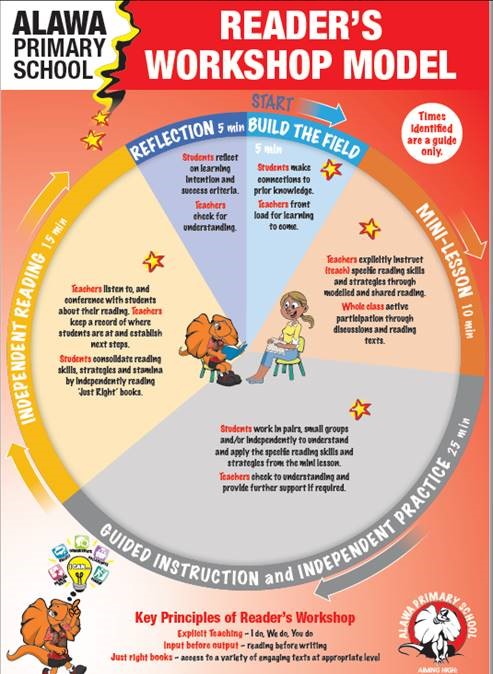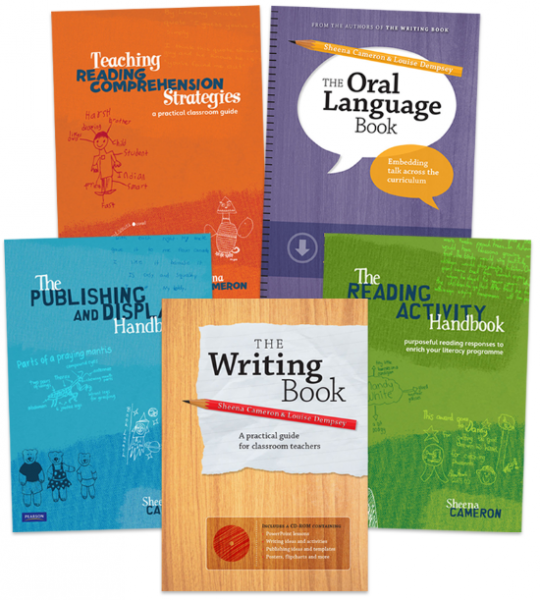To embed a whole school approach to the teaching and learning of literacy in a connected way that is sustainable and has meaningful impact on student outcomes.
English
- Page navigation
Our whole Alawa Connected Literacy Approach includes:
Effective literacy programs enable students to move between reading and writing, and involve them in speaking and listening experiences which support and extend their literacy learning and skills (Christie, 2005).
Oral language is at the core of our whole school literacy approach. It lays the foundation for the reading and writing skills children will develop as they progress through school.
At Alawa we use two workshop models that connect all elements of the acquisition of literacy.
The Alawa Reading and Writing Workshops provide a structure to the effective instruction of Reading and Writing. An important factor in our workshop models is the connection between Reading, Writing and listening and speaking as well as fostering a love of reading and writing.
Both Reading and Writing workshops:
- include dedicated, uninterrupted blocks of time for reading and writing that occur regularly
- make clear connections between meaning making in reading and writing
- support students to understand the difference between spoken and written language as they progress through the primary years
- ensure students engage in peer conferences at all phases of the reading and writing process
- use rich, authentic texts as mentor or model texts
- ensure teachers model reading and writing and make their own processes visible
- provide scaffolding and feedback to students at all stages of the reading/writing process
- include explicit instruction about foundational phonic and phonological skills necessary to encode meaning as well as knowledge about language

Writer's Workshop Model
Alawa writers Workshop is a teaching model encompasses a range of teaching practices such as modelled writing, shared writing, interactive writing and independent writing where varying levels of support can be provided at different points of need. It includes explicit instruction about the processes of writing, structural and grammatical features of genres, and spelling. It has an emphasis on ‘writing as a process’, and where individual interest and choice are fundamental to students becoming independent writers.
An important component of the Writing Workshop approach is the Writer’s Notebook. This is a place for students to save their words—in the form of a memory, a reflection, a list, a rambling of thoughts, a sketch.
Key research by Christine Topfer and Deirdre Arendt underpins Alawa’s approach to spelling. Their approach is underpinned by a holistic and inquiry-based learning approach to spelling using Big Ideas. It is designed to support teachers to foster a culture of word noticing, transforming students into curious thinkers and effective, competent spellers. Other programs that support our instruction include Words Their Way (Yr 2-6) and Sound Waves (T-1)
Readers Workshop
Alawa’s Readers workshop is a teaching model which allows students to engage in authentic reading experiences. It is an effective way to differentiate instruction and provide opportunities for selecting and reading books, writing about books as well as sharing ideas about books individually, with a partner or in group discussions.
The Reader’s Workshop is about teachers, teaching reading strategies and students authentically using those strategies immediately in their self-selected, ‘Just Right Books’. It involves the shared reading of quality mentor texts to explicitly teaching reading skills and strategies.
Throughout the Readers workshop thee is the explicit teaching of Reading Strategies. Sheena Cameron’s work provides a framework for the selection and teaching of specific reading strategies that the students need to acquire to be effective readers.

